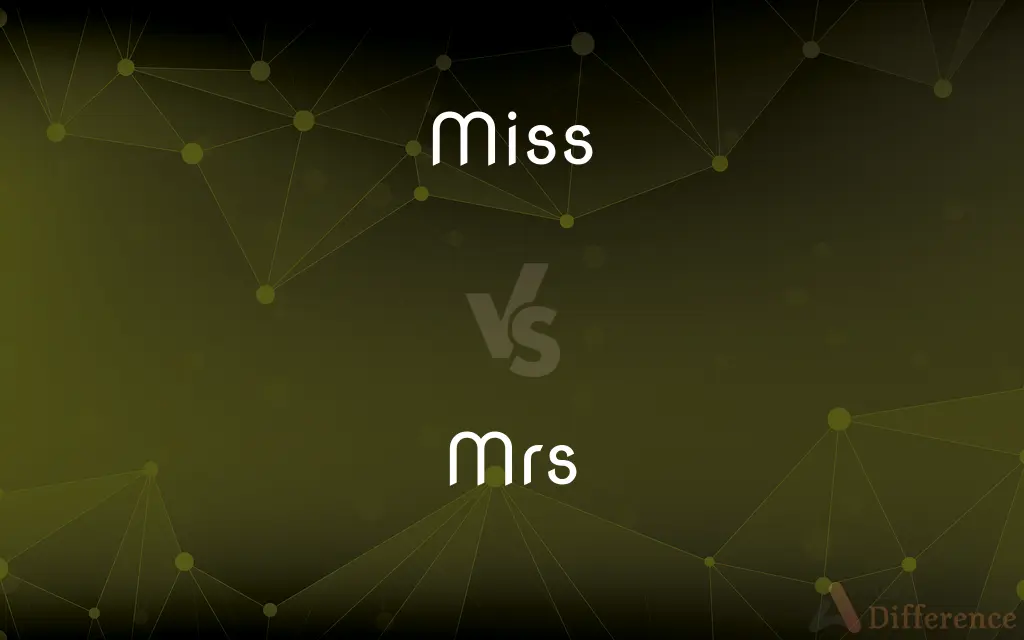Miss vs. Mrs — What's the Difference?
By Maham Liaqat & Urooj Arif — Updated on March 25, 2024
"Miss" refers to an unmarried woman, while "Mrs." is used for a married woman, reflecting their marital status.

Difference Between Miss and Mrs
Table of Contents
ADVERTISEMENT
Key Differences
"Miss" is a title used to address or refer to an unmarried woman, traditionally signaling her marital status without indicating her age. It is often used in formal situations and documents to denote a woman who has not married. On the other hand, "Mrs." is the title given to a married woman and is typically followed by her husband's last name. This distinction in usage underscores the societal importance historically placed on a woman's marital status.
The origin of "Miss" can be traced back to English courtesy titles, where it was derived from "mistress," but evolved to specifically refer to younger, unmarried women. "Mrs." also originated from "mistress," but its use became reserved for married women, indicating their relationship to their husbands. Over time, these titles have come to play a significant role in social etiquette, guiding how women are addressed in both personal and professional contexts.
In contemporary usage, the preference for these titles has become more fluid, with some women choosing to use "Miss" or "Mrs." based on personal preference rather than marital status. Additionally, the introduction of "Ms." as a neutral alternative has provided women with the option to use a title that does not disclose their marital status, reflecting changing attitudes towards women's autonomy and identity.
The use of "Miss" and "Mrs." also varies culturally and geographically, with some regions and communities having distinct norms and preferences for addressing women. This variation highlights the diversity of practices related to titles and the evolving nature of language and social customs.
Despite these differences, both "Miss" and "Mrs." continue to be widely used, each carrying its own implications and connotations. The choice between these titles can convey respect, politeness, and sensitivity to a woman's personal situation, emphasizing the importance of language in social interactions.
ADVERTISEMENT
Comparison Chart
Meaning
Unmarried woman
Married woman
Origin
Derived from "mistress," indicating a younger, unmarried woman
Derived from "mistress," used for a married woman, typically with her husband's last name
Contemporary Usage
Preference based on personal choice, not just marital status
Used based on marital status, but also influenced by personal preference
Alternative
"Ms." as a neutral option
"Ms." as a neutral option, especially in professional contexts
Cultural Variations
Varies by region and community norms
Varies by region and community norms
Compare with Definitions
Miss
Reflects traditional courtesy titles.
Miss is derived from historical forms of address.
Mrs
Mrs. is used for married women.
Mrs. Jones will be your point of contact.
Miss
Often used for younger women.
The invitation is addressed to Miss Jane Doe.
Mrs
Traditionally follows husband's last name.
She is known as Mrs. Robert Smith.
Miss
Miss is a title for unmarried women.
Miss Smith will be attending the meeting.
Mrs
Can be a sign of respect.
Mrs. is often used to show respect in social settings.
Miss
Indicates marital status.
She prefers to be called Miss regardless of her age.
Mrs
Reflects a woman's marital status.
Using Mrs. indicates she is married.
Miss
Can denote a teacher.
The students love Miss Johnson's classes.
Mrs
Usage varies by personal preference.
Some married women still prefer Miss or Ms.
Miss
Miss (pronounced ) is an English language honorific traditionally used only for an unmarried woman (not using another title such as "Doctor" or "Dame"). Originating in the 17th century, it is a contraction of mistress, which was used for all women.
Mrs
The title used before a surname or full name to address or refer to a married woman without a higher or honorific or professional title
Mrs Sally Jones
Miss
To fail to hit, reach, catch, or otherwise make contact with
He swung at and missed the ball. The winger missed the pass. The ball missed the basket.
Mrs
Used as a courtesy title for a married, widowed, or divorced woman before her own surname or full name
Mrs. Doe.
Mrs. Jane Doe. See Usage Note at miss2.
Miss
To be too late for or fail to meet (a train, for example).
Mrs
Used as a courtesy title for a married or widowed woman before the surname or full name of her husband
Mrs. Doe.
Mrs. John Doe.
Miss
To fail to perceive, experience, or understand
I missed my favorite TV show last night. You completely missed the point of the film.
Mrs
Used in informal titles for a married woman to indicate the epitomizing of an attribute or activity
Mrs. Wonderful.
Mrs. Organization.
Miss
To fail to accomplish or achieve
Just missed setting a new record.
Mrs
A form of address for a married woman
Miss
To fail to attend or perform
Never missed a day of work.
Miss
To fail to answer correctly
Missed three questions on the test.
Miss
To fail to benefit from; let slip
Miss a chance.
Miss
To escape or avoid
We took a different way and missed the traffic jam.
Miss
To discover the absence or loss of
I missed my book after getting off the bus.
Miss
To be without; lack
A cart that is missing a wheel.
Miss
To feel the lack or loss of
Do you miss your family?.
Miss
To fail to hit or otherwise make contact with something
Took a shot near the goal and missed.
Miss
To be unsuccessful; fail
A money-making scheme that can't miss.
Miss
To misfire, as an internal-combustion engine.
Miss
A failure to hit or make contact with something.
Miss
A failure to be successful
The new movie was a miss.
Miss
The misfiring of an engine.
Miss
Miss Used as a courtesy title before the surname or full name of a girl or single woman.
Miss
Used as a form of polite address for a girl or young woman
I beg your pardon, miss.
Miss
A young unmarried woman.
Miss
Miss Used in informal titles for a young woman to indicate the epitomizing of an attribute or activity
Miss Organization.
Miss Opera.
Miss
Mis·ses A series of clothing sizes for women and girls of average height and proportions.
Miss
(ambitransitive) To fail to hit.
I missed the target.
I tried to kick the ball, but missed.
Miss
(transitive) To fail to achieve or attain.
To miss an opportunity
Miss
(transitive) To avoid; to escape.
The car just missed hitting a passer-by.
Miss
(transitive) To become aware of the loss or absence of; to feel the want or need of, sometimes with regret.
I miss you! Come home soon!
Miss
(transitive) To fail to understand;
Miss the joke
Miss
(transitive) To fail to notice; to have a shortcoming of perception; overlook.
So I'm just going over my early notes, see if I missed anything.
Miss
(transitive) To fail to attend.
Joe missed the meeting this morning.
Miss
(transitive) To be wanting; to lack something that should be present.
The car is missing essential features.
Miss
To spare someone of something unwanted or undesirable.
Miss me with that nonsense!
Miss
To fail to help the hand of a player.
Player A: J7. Player B: Q6. Table: 283. The flop missed both players!
Miss
(sports) To fail to score (a goal).
Miss
To go wrong; to err.
Miss
To be absent, deficient, or wanting.
Miss
A failure to hit.
Miss
A failure to obtain or accomplish.
Miss
An act of avoidance give}}
I think I’ll give the meeting a miss.
Miss
(computing) The situation where an item is not found in a cache and therefore needs to be explicitly loaded.
Miss
A title of respect for a young woman (usually unmarried) with or without a name used.
You may sit here, miss.
You may sit here, Miss Jones.
Miss
An unmarried woman; a girl.
Miss
A kept woman; a mistress.
Miss
(card games) In the game of three-card loo, an extra hand, dealt on the table, which may be substituted for the hand dealt to a player.
Miss
A title of courtesy prefixed to the name of a girl or a woman who has not been married. See Mistress, 5.
Miss
A young unmarried woman or a girl; as, she is a miss of sixteen.
Gay vanity, with smiles and kisses,Was busy 'mongst the maids and misses.
Miss
A kept mistress. See Mistress, 4.
Miss
In the game of three-card loo, an extra hand, dealt on the table, which may be substituted for the hand dealt to a player.
Miss
The act of missing; failure to hit, reach, find, obtain, etc.
Miss
Loss; want; felt absence.
There will be no great miss of those which are lost.
Miss
Mistake; error; fault.
He did without any great miss in the hardest points of grammar.
Miss
Harm from mistake.
Miss
To fail of hitting, reaching, getting, finding, seeing, hearing, etc.; as, to miss the mark one shoots at; to miss the train by being late; to miss opportunites of getting knowledge; to miss the point or meaning of something said.
When a man misses his great end, happiness, he will acknowledge he judged not right.
Miss
To omit; to fail to have or to do; to get without; to dispense with; - now seldom applied to persons.
She would never miss, one day,A walk so fine, a sight so gay.
We cannot miss him; he does make our fire,Fetch in our wood.
Miss
To discover the absence or omission of; to feel the want of; to mourn the loss of; to want; as, to miss an absent loved one.
Neither missed we anything . . . Nothing was missed of all that pertained unto him.
What by me thou hast lost, thou least shalt miss.
Miss
To fail to hit; to fly wide; to deviate from the true direction.
Men observe when things hit, and not when they miss.
Flying bullets now,To execute his rage, appear too slow;They miss, or sweep but common souls away.
Miss
To fail to obtain, learn, or find; - with of.
Upon the least reflection, we can not miss of them.
Miss
To go wrong; to err.
Amongst the angels, a whole legionOf wicked sprites did fall from happy bliss;What wonder then if one, of women all, did miss?
Miss
To be absent, deficient, or wanting.
What here shall miss, our toil shall strive to mend.
Miss
A young woman;
A young lady of 18
Miss
A failure to hit (or meet or find etc)
Miss
Fail to perceive or to catch with the senses or the mind;
I missed that remark
She missed his point
We lost part of what he said
Miss
Feel or suffer from the lack of;
He misses his mother
Miss
Fail to attend an event or activity;
I missed the concert
He missed school for a week
Miss
Leave undone or leave out;
How could I miss that typo?
The workers on the conveyor belt miss one out of ten
Miss
Fail to reach or get to;
She missed her train
Miss
Be without;
This soup lacks salt
There is something missing in my jewellery box!
Miss
Fail to reach;
The arrow missed the target
Miss
Be absent;
The child had been missing for a week
Miss
Fail to experience;
Fortunately, I missed the hurricane
Common Curiosities
How do Miss and Mrs. reflect societal attitudes towards marriage?
They historically signaled a woman's marital status, reflecting societal emphasis on marriage, though attitudes are shifting.
Can a woman choose between Miss and Mrs. based on personal preference?
Yes, some women choose based on personal preference, especially with the option of "Ms." as a neutral title.
What's the difference between Miss and Mrs.?
"Miss" is for unmarried women, while "Mrs." is for married women.
What title should be used when a woman's marital status is unknown?
"Ms." is a safe and respectful choice when a woman's marital status is unknown.
Does Miss imply a certain age?
Traditionally, it implied a younger woman, but it's not strictly used based on age today.
Is it appropriate to use Mrs. with a woman's first name?
Traditionally, "Mrs." is used with the husband's last name, but contemporary usage varies.
Why do some professional settings prefer using Ms.?
"Ms." is preferred in professional settings to focus on the individual's role rather than marital status.
What is the neutral alternative to Miss and Mrs.?
"Ms." serves as a neutral alternative, not indicating marital status.
Can unmarried women be addressed as Mrs. if they prefer?
It's unconventional but possible, especially if they prefer not to disclose their marital status.
Are there cultural differences in using Miss and Mrs.?
Yes, the usage and preferences for these titles can vary significantly across different cultures and regions.
Share Your Discovery

Previous Comparison
Metric vs. Stats
Next Comparison
Staff vs. ColleagueAuthor Spotlight
Written by
Maham LiaqatCo-written by
Urooj ArifUrooj is a skilled content writer at Ask Difference, known for her exceptional ability to simplify complex topics into engaging and informative content. With a passion for research and a flair for clear, concise writing, she consistently delivers articles that resonate with our diverse audience.














































